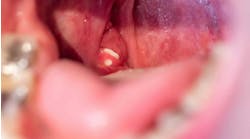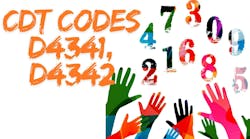Dear RDH:
On Sept. 26 2003, I was audited by the State for proof of CEUs from March 2001 to March 2003. Promptly, I submitted 22 completed credit hours. On July 8 2004, I received notice that six of these credits were unacceptable to the Board.
The name of the "unacceptable" course was OSHA: Ergonomics. (Being the OSHA coordinator in our office, my very generous boss paid $229 for me to attend.) I was told to send more CEUs for 01-03 or a letter of explanation. My letter explained that I had no more CEUs to submit.
This was unacceptable to them. I took this matter to our state representative who is also a loyal patient. She could not resolve this matter, either. The state's attorney called and said I could be fined up to $1,500. I then hired an attorney and paid him a $1,000 retainer. The state's attorney filed four different consent agreements, three of which contained incorrect dates, fines, and even dental title. My lawyer and I were asked to "overlook" all of these mistakes.
In the end, I was fined $200 and had to submit four CEUs from 2005. (By the way, I had offered four current credits and was denied, initially.) All in all, I paid $810 in lawyer's fees, hospitalized for five days due to this severe stress, placed on mood stabilizing medication, and unable to work full days.
I called the Board to ask who I can call to be sure courses will be approved prior to taking them. There is no such program in place. Some impatient, unpleasant woman told me to refer to the Dental Code Sections 33.401 to 33.404. Bottom line: Don't let this happen to you. Make sure your courses are approved
Learning in Pennsylvania
Dear Pennsylvania:
Acknowledging your was situation was frustrating, costly and time-consuming, yet it's a lesson we as licensed professionals can all learn from. It's often easy to re-direct the blame of failure to meet license renewal requirements on the "board" or even the actual CE program. Each states' practice act, clearly defines what is acceptable or not in regard to continuing education credits for that particular state.
Each state has a department, which approves courses through that states approved providers. It is the licensees' responsibility to ascertain if the course they are attending is actually approved for their own state's license renewal requirements.
It has happened, in the past, that a national meeting-provides continuing education credits to attendees, yet the CE credits where not accepted in the state that the meeting was being held.
Your education is important to yourself and the patients, which you are responsible to treat. If your state requires 25 credits every two years, it would be my recommendation to always take 35 credits to be on the safe side, avoid scrutiny, frustration or the expense of a citation.
TRICIA OSUNA, RDH, BS, Tricia received a Bachelor of Science degree in Dental Hygiene from the School of Dentistry, University of Southern California in 1978. She was in clinical practice in the Los Angeles area until July 2001, and now continues to work in various dental offices. She served for four years as the Dental Hygienist Representative on the USC Dental Alumni Association Board of Directors. In addition to private practice, Tricia was a clinical instructor at the UCLA School of Dentistry in the Department of Advanced General Dentistry. In March of 2002 Governor Gray Davis of California appointed Tricia to a four year term as a Board Member on the Dental Board of California. Professionally, Tricia has been quite active in her professional Association since graduation, serving as an elected delegate to the Annual Sessions of the Southern California Dental Hygienists Association, California Dental Hygienists' Association and American Dental Hygienists' Association. Tricia has also served as President of the South Bay Dental Hygienists' Society along with numerous positions in both Los Angeles and South Bay Dental Hygienists' Societies. In 1992 she was elected to a term as President of the California Dental Hygienists' Association. Recognized for her many efforts and contributions to the Dental Hygiene profession, Tricia has received several awards including the CDHA's President's Recognition Award, the ADHA Bausch and Lomb "Distinctions in Dental Hygiene" Award and most recently, the American Dental Hygienists' Association Distinguished Service Award.





